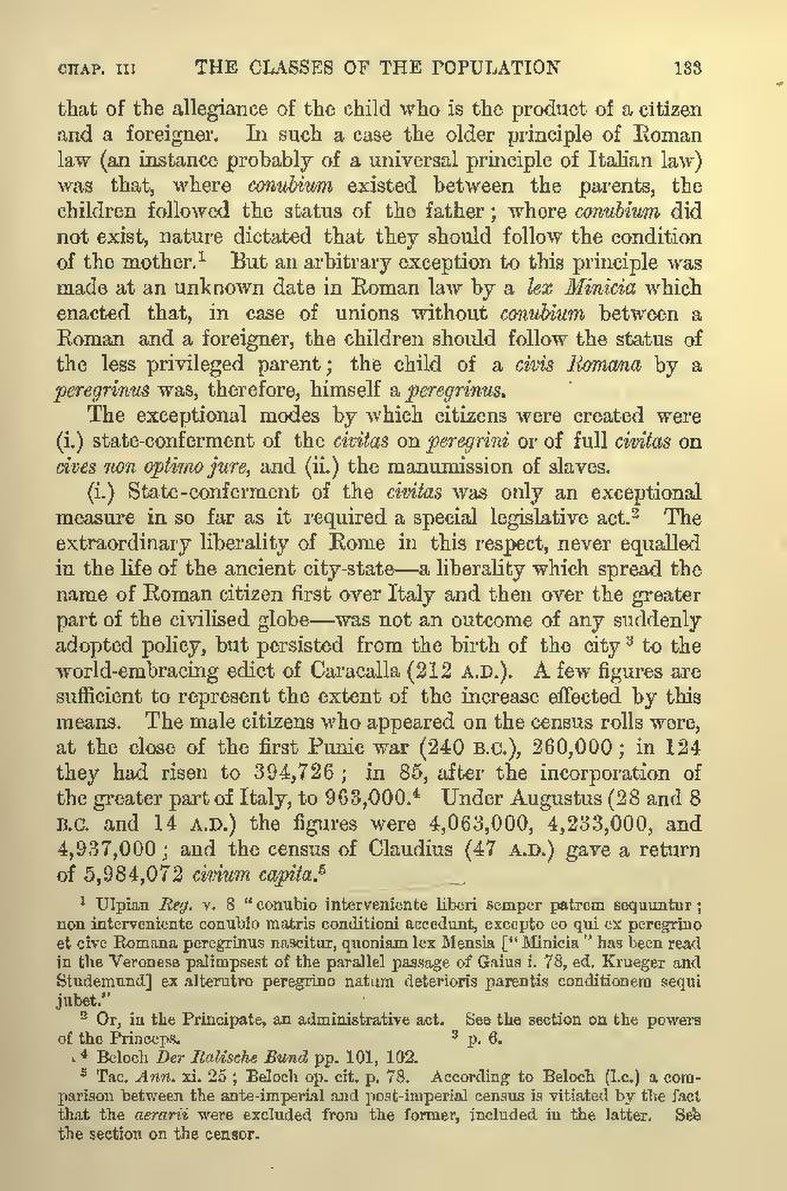that of the allegiance of the child who is the product of a citizen and a foreigner. In such a case the older principle of Roman law (an instance probably of a universal principle of Italian law) was that, where conubium existed between the parents, the children followed the status of the father; where conubium did not exist, nature dictated that they should follow the condition of the mother.[1] But an arbitrary exception to this principle was made at an unknown date in Roman law by a lex Minicia which enacted that, in case of unions without conubium between a Roman and a foreigner, the children should follow the status of the less privileged parent; the child of a civis Romana by a peregrinus was, therefore, himself a peregrinus.
The exceptional modes by which citizens were created were (i.) state-conferment of the civitas on peregrini or of full civitas on cives non optimo jure, and (ii.) the manumission of slaves.
(i.) State-conferment of the civitas was only an exceptional measure in so far as it required a special legislative act.[2] The extraordinary liberality of Rome in this respect, never equalled in the life of the ancient city-state—a liberality which spread the name of Roman citizen first over Italy and then over the greater part of the civilised globe—was not an outcome of any suddenly adopted policy, but persisted from the birth of the city[3] to the world-embracing edict of Caracalla (212 A.D.). A few figures are sufficient to represent the extent of the increase effected by this means. The male citizens who appeared on the census rolls were, at the close of the first Punic war (240 B.C.), 260,000; in 124 they had risen to 394,726; in 85, after the incorporation of the greater part of Italy, to 963,000.[4] Under Augustus (28 and 8 B.C. and 14 A.D.) the figures were 4,063,000, 4,233,000, and 4,937,000; and the census of Claudius (47 A.D.) gave a return of 5,984,072 civium capita.[5]ex alterutro peregrino natum deterioris parentis conditionem sequi jubet."]
- ↑ Ulpian Reg. v. 8 "conubio interveniente liberi semper patrem sequuntur; non interveniente conubio matris conditioni accedunt, excepto eo qui ex peregrino et cive Romana peregrinus nascitur, quoniam lex Mensia ["Minicia" has been read in the Veronese palimpsest of the parallel passage of Gaius i. 78, ed. Krueger and Studemund
- ↑ Or, in the Principate, an administrative act. See the section on the powers of the Princeps.
- ↑ p. 6.
- ↑ Beloch Der Italische Bund pp. 101, 102.
- ↑ Tac. Ann. xi. 25; Beloch op. cit. p. 78. According to Beloch (l.c.) a comparison between the ante-imperial and post-imperial census is vitiated by the fact that the aerarii were excluded from the former, included in the latter. See the section on the censor.
